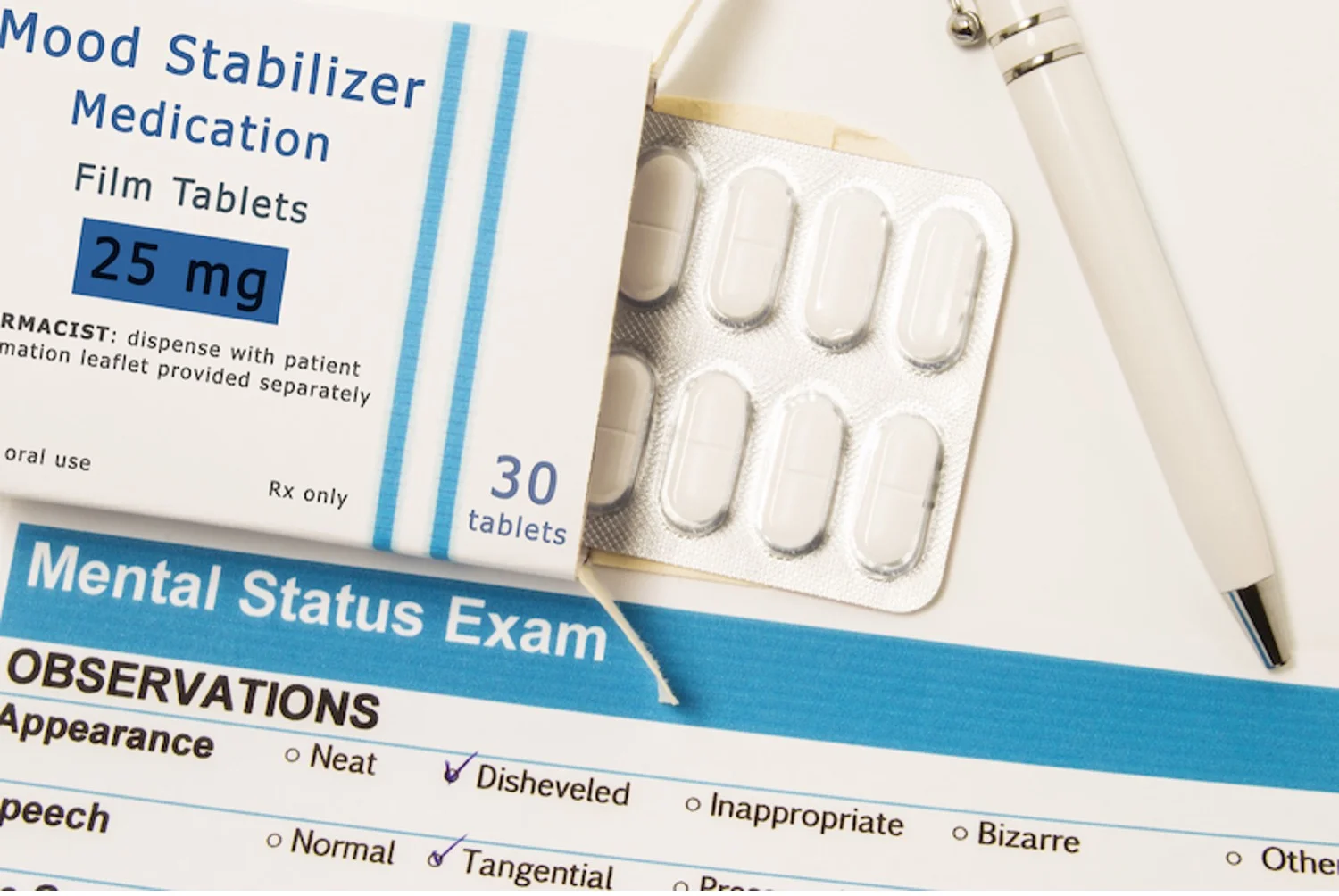
Bipolar disorder can negatively impact the lives of those who suffer from the condition and is fatal in many cases. In fact, people with bipolar disorder are six times more likely to die an early death than those without the condition. While there is no cure for bipolar disorder, there are treatments available that can dramatically improve a person’s quality of life. We’ll explore those options here so you can make the best decision for your mental well-being.
Understanding Bipolar Disorder
Bipolar disorder, formerly known as manic depression or manic-depressive disorder, is a mental health condition characterized by:
- Depressive episodes: Low mental and physical energy, low moods, and feelings of sadness, hopelessness, and worthlessness.
- Manic episodes: High levels of mental and physical energy, elevated mood, reduced need for sleep, impulsive decision-making, and difficulty determining what is real and what is not.
- Hypomanic episodes: Same characteristics as a manic episode except difficulty differentiating what’s real versus what is not.
There are three types of bipolar disorder:
- Bipolar I disorder: Patient has at least one manic episode, with or without depressive episodes.
- Bipolar II disorder: Patient has at least one hypomanic episode (but no manic episodes) and at least one major depressive episode.
- Cyclothymia: Patient has hypomanic episodes with depressive episodes that are not severe enough to be classified as major.
These are not rigid categories; patients can have symptoms that span different types of bipolar disorders.
How Bipolar Disorder Is Diagnosed
The only way to diagnose bipolar disorder is by consulting with a licensed psychiatrist or psychologist. Bipolar disorder can be difficult to diagnose because it has symptoms that very closely mirror those of many other mental illnesses. In fact, many people with bipolar disorder are misdiagnosed and improperly treated for years. One of the most common ways people are diagnosed with bipolar disorder is when they receive anti-depressants for a misdiagnosis of depression that sends them into a severe manic stage. It is only through multiple treatment sessions, often over a period of several months or a year, that a therapist can get a solid diagnosis of bipolar disorder. That’s because they have to see the patient in multiple phases of the cycle, which the patient may not even be aware is occurring.
Medication-Based Treatment for Bipolar Disorder
 Some of the most effective medication-based treatments for bipolar disorder include mood stabilizers, atypical antipsychotics, and antidepressants. These are often combined with psychological treatments (discussed below) to ensure the patient has the tools to manage both symptoms and triggers of the condition.
Some of the most effective medication-based treatments for bipolar disorder include mood stabilizers, atypical antipsychotics, and antidepressants. These are often combined with psychological treatments (discussed below) to ensure the patient has the tools to manage both symptoms and triggers of the condition.
Mood Stabilizers
- Lithium
- How it works: Regulates neurotransmitter activity in the brain, especially those related to mood and emotion; thought to alter glutamate and gamma-aminobutyric acid (GABA) transmission.
- Pros:
- Proven effectiveness at reducing the frequency and severity of manic, hypomanic, and depressive episodes
- Long history of use
- Large amount of research backing
- Cons:
- Requires careful monitoring of blood levels
- Significant and severe side effects
- Not suitable for individuals with specific medical health issues
- Anticonvulsants (valproic acid, lamotrigine)
- How it works: Stabilizes moods by altering neurotransmitter activity; valproic acid increases GABA transmission; lamotrigine affects glutamate levels.
- Pros:
- Proven effectiveness in reducing the severity and frequency of manic episodes
- Lamotrigine is especially effective in preventing depressive episodes
- Cons:
- Significant and severe side effects
Atypical Antipsychotics
- Abilify
- How it works: Stabilizes moods by impacting the levels of dopamine and serotonin in the brain.
- Pros:
- Effective at treating manic, hypomanic, and depressive episodes
- Lower risk of metabolic issues and weight loss than most alternatives
- Cons:
- Significant and severe side effects
- Lurasidone
- How it works: Stabilizes moods by impacting the levels of dopamine and serotonin in the brain.
- Pros:
- Effective at treating manic, hypomanic, and depressive episodes
- Lower risk of weight gain and sedation than most alternatives
- Cons:
- May cause prolonged periods of mania
- Significant and severe side effects
- Quetiapine
- How it works: Stabilizes moods by impacting the levels of dopamine and serotonin in the brain.
- Pros:
- Effective for acute treatment of manic and depressive episodes
- Lower risk of weight gain than most alternatives
- Cons:
- Significant and severe side effects
- Cariprazine
- How it works: Stabilizes moods by impacting the levels of dopamine and serotonin in the brain
- Pros:
- Effective for acute treatment of manic and depressive episodes
- Lower risk of weight gain than most alternatives
- Cons:
- Significant and severe side effects
Antidepressants and Bipolar Depression
- SNRIs (Serotonin Norepinephrine Reuptake Inhibitors)
- How it works: Alleviate depression symptoms by increasing the levels of serotonin and norepinephrine in the brain.
- Pros:
- Effective at treating depressive episodes
- Can also treat anxiety symptoms
- Cons:
- May induce prolonged and/or severe mania when not used with a mood stabilizer
- Significant and severe side effects
- SSRIs (Selective Serotonin Reuptake Inhibitors)
- How it works: Alleviate depression symptoms by increasing serotonin levels.
- Pros:
- Effective at treating depressive episodes
- Users generally see comparatively few side effects
- Cons:
- May induce prolonged and/or severe mania when not used with a mood stabilizer
- Significant and severe side effects
- TCAs (Tricyclic Antidepressants)
- How it works: Alleviate depression symptoms by affecting the reuptake of various neurotransmitters, including serotonin and norepinephrine.
- Pros:
- Effective at alleviating depressive symptoms
- Cons:
- May induce prolonged and/or severe mania when not used with a mood stabilizer
- Rarely used because of the comparatively high likelihood of significant and severe side effects
Psychotherapy Treatments for Bipolar Disorder
 Some of the most common and effective psychotherapy treatments for bipolar disorder include cognitive behavioral therapy, interpersonal and social rhythm therapy, and family-focused therapy.
Some of the most common and effective psychotherapy treatments for bipolar disorder include cognitive behavioral therapy, interpersonal and social rhythm therapy, and family-focused therapy.
Cognitive Behavioral Therapy (CBT)
The goal of cognitive behavioral therapy (CBT) is to help individuals change negative thought patterns and behaviors. CBT uses structure and a goal-oriented approach to help individuals develop a healthier way of thinking and coping with their emotions. CBT is helpful for the treatment of bipolar disorder because it addresses distorted thinking patterns that often worsen or are worsened by manic, hypomanic, or depressive episodes. CBT also teaches participants to recognize triggers, manage stress, and use problem-solving skills. CBT has also been shown to improve medication adherence and symptom management.
Interpersonal and Social Rhythm Therapy (IPSRT)
The goal of interpersonal and social rhythm therapy (IPSRT) is to stabilize daily routines and social rhythms. IPSRT has been shown to help bipolar patients maintain regular sleep patterns, mealtimes, and social activities. IPSRT is helpful for treating bipolar disorder because it helps prevent mood episodes often caused by disruptions to daily routines and sleep patterns. IPSRT also helps bipolar patients establish and maintain a routine, manage potentially triggering social interactions and relationships, and recognize how life events impact their mood.
Family-Focused Therapy (FFT)
The goal of family-focused therapy (FFT) is to improve communication, problem-solving, and coping skills within the family. FFT focuses on working extensively with the bipolar patient and their family. FFT is helpful for the treatment of bipolar disorder because it reduces the frequency and severity of manic and depressive episodes, as well as their impact on the lives of the patient and their families. FFT improves family dynamics and communication, which in turn reduces stress and improves support, which in turn prevents and/or alleviates bipolar episodes.
Lifestyle Changes to Help with Bipolar Disorder
Lifestyle choices can heavily contribute to the severity and frequency of bipolar episodes and therefore the impact the condition has on patients’ lives. Some lifestyle changes that serve as particularly effective treatments for bipolar disorder include:
- Diet: A balanced and nutritious diet can improve mood stability, energy levels, and overall well-being. Consuming more healthy nutrients like omega-3 fatty acids may improve moods, while eliminating things like excessive sugar may reduce mood swings.
- Exercise: Maintaining a regular exercise routine has numerous mental and medical health benefits, including releasing mood-lifting endorphins, reducing depression and anxiety symptoms, improving sleep quality, and lowering stress levels
- Sleep: A routine and adequate sleep schedule helps regulate mood. This is especially important, as bipolar episodes often dramatically impact sleep patterns.
- Sobriety: Drugs and alcohol can dramatically increase the severity and frequency of both manic and depressive episodes. They can especially worsen the poor judgment and impulsivity that typify manic episodes. By eliminating substance use, bipolar sufferers can prevent manic and depressive episodes from happening, dramatically reduce the severity of symptoms, and improve their lives in many ways, not just those that relate to bipolar.
- Stress management: Effective stress management techniques can help reduce mood fluctuations. Healthy coping strategies can also prevent symptom escalation and even the onset of episodes during high-stress times.
Managing Bipolar Disorder for the Long Term
There is no cure for bipolar disorder, which means that all sufferers must manage their condition for the long term. For the vast majority of patients, this will require a combination of medication, regular therapy, and lifestyle changes. Psychiatric mental health nurse practitioner (PMHNP) Valerie Puffenberger provides the following tips for managing bipolar disorder for the long term:
- Maintain a consistent daily routine, including regular sleep and meal patterns.
- Exercise regularly to help improve mood and reduce stress.
- Limit or avoid alcohol and drug use.
- Develop stress management techniques, such as mindfulness, meditation, or deep breathing exercises.
- Building a strong support system of family, friends, and support groups.
- Monitor and manage early warning signs of mood swings or relapse.
- Adhere to prescribed medication and attend regular healthcare appointments.
It’s important to remember that nobody’s perfect and relapse is a possibility. Make sure you’re prepared with a post-relapse plan, which could include:
- Seeking professional help.
- Establishing a non-judgmental support system.
- Practicing self-compassion.
- Resuming your treatment plan.
- Identifying and building coping skills to deal with triggers.
Find Treatment for Bipolar Disorder Today
Living with bipolar disorder can feel overwhelming, especially during times of instability or uncertainty. But with the right support, it is possible to regain balance, develop clarity, and experience a more grounded, fulfilling life. At Legacy Healing Center, we offer tailored care that blends advanced clinical insight with wholehearted support.
Our three-pronged approach to bipolar disorder includes:
-
Psychotropic medications to help regulate mood and restore neurological balance
-
Evidence-based psychotherapy to build emotional resilience and coping strategies
-
Supportive peer connection that fosters community, validation, and long-term healing
Whether you’re managing bipolar disorder on its own or alongside substance use, our team is here to walk with you every step of the way. To speak with someone who can help, call 888-534-2295 today.
Ready to Take the Next Step?
You don’t have to navigate bipolar disorder alone. Legacy Healing Center provides integrated, personalized support in a setting where compassion meets clinical excellence. We’re here to help you move forward—steadily, confidently, and with the care you deserve.
Call 888-534-2295 to speak with a member of our team, verify your insurance, and begin your journey toward lasting healing.
Sources
- National Institute of Mental Health. (2023). Bipolar Disorder.
- American Psychiatric Association. (2021). What Are Bipolar Disorders?
- Substance Abuse and Mental Health Services Administration. (2023). Bipolar Disorder.
- National Alliance on Mental Illness. (2017). Bipolar Disorder.
- Stanford Medicine. (n.d.). What Is Bipolar Disorder?
- British Medical Journal. (2023). Bipolar disorder linked to 6-fold heightened risk of early death from external causes.


 Written By:
Written By: Edited By:
Edited By: Clinically Reviewed By:
Clinically Reviewed By: 




 Verify Insurance
Verify Insurance